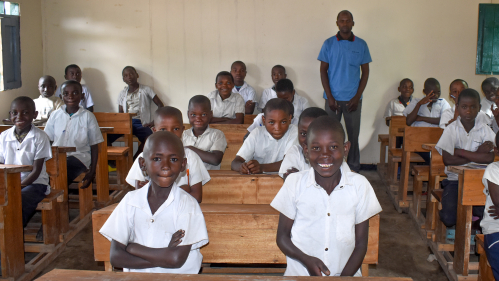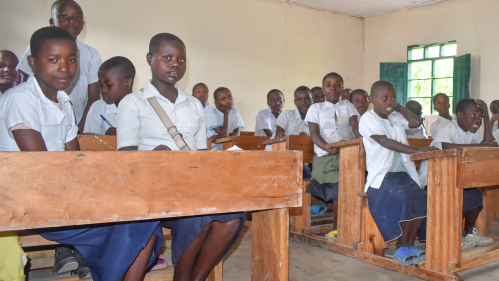Alumnus Builds Better Future for Children in the Democratic Republic of the Congo

Dan Torsiello’s passion for education and his approach to challenges – shaped as an undergraduate at Rutgers-New Brunswick – are driving him to help children 7,000 miles away through a project to build a primary school in the Democratic Republic of the Congo (DRC).
Torsiello, a world and African history high school social studies teacher, started a nonprofit, The Kivu Project, with fellow New Jersey native and Seton Hall graduate Jackie Jaramillo. The organization opened the school this fall and is now focused on constructing an orphanage to accommodate 120 children, as well as a small medical center, in the rural area.
“The place is magnificent,” said Torsiello. “By mineral wealth, it's the wealthiest country on the planet. All the electronics that go into our phones use Congo resources. It's all conflict minerals and in the middle of this conflict are eight-year-olds who want to learn French, write and do math. Our purpose is to help them.”
The place is magnificent. By mineral wealth, it's the wealthiest country on the planet.
Dan Torsiello
The Kivu Project
The DRC has a history of conflict, where various armies, rebel groups and outside actors have profited from mining raw materials or minerals while contributing to violence and exploitation in the region.
Torsiello first became aware of the Congolese people’s plight when he took a class on the History of European Colonialism at Rutgers, where he was also a men’s basketball team manager. He still has the assigned book, King Leopold’s Ghost, in his bookcase at Central Regional High School in Berkeley Township, where he also coaches girls’ varsity basketball.
“We talked about the Belgian Congo under King Leopold, which is now the DRC, and I was fascinated,” said Torsiello. “I never knew the brutality. You don't learn that version of history in high school.”

After graduating with a bachelor of arts in history, Torsiello taught honors social studies at Benjamin Banneker Academy in East Orange.
“Most of my kids were Haitian, who had fled the earthquake, or West African, who fled the Liberian Civil War. They were all students whose parents got them out for a better life. They would tell me about their homes and cultures, sights and sounds. It watered a seed that Rutgers had planted.”
A passionate traveler since participating in a youth exchange program to Australia, Torsiello took his initial trip to Africa in 2016. During a return trip in 2021, he was introduced to a village school master, who simply asked if he would help.
“I had no idea what it was going to entail, but I answered yes,” said Torsiello, whose fundraising efforts started soon after the trip.
He has used the skills he developed at Rutgers in much of his work.

Student managers are more than the unsung heroes of college basketball, they are its essential workers. Practice preparation, player services, office management, video, travel and equipment are among the critical areas they support, sometimes with little financial benefit, to carve out a space in the sports world.
“As a student basketball manager, you just learn to solve problems,” said Torsiello. “Things come up and you get them done, whatever it takes.”
Torsiello worked as a team manager under head coach Fred Hill for four seasons, serving as head manager in 2009-10.
“You didn't do it for praise or adulation, you did it because you’re doing a job to the best of your ability,” said Torsiello, who keeps in touch with many of the managers, players and staffers he worked with. “I was always satisfied with that. You learn to organize effort and see challenges through.”

The school in the DRC opened in September with six classrooms, six bathrooms and two offices, as well as rainwater collection and solar power systems. There are desks for every student and teacher, computers and printers for administrators, a two-year inventory of supplies and basketball hoops for recreation. Utilized as a primary school during the day and by secondary students in the evening, the school educates 260 children ages 4 through 17.
“We were able to buy the textbooks that we needed,” said Torsiello. “The availability of textbooks is very hit-or-miss there, but we found the help to get it done.”
More people have died in the eastern Congo than anywhere else in the world since World War II. It's not safe.
Dan Torsiello
The Kivu Project
He works with organization’s local coordinator, Christian Aganze, a guide who operates a travel company in the DRC. They first met when Aganze hosted Torsiello on a trek into the mountains of Virunga National Park to view mountain gorillas, when he welcomed the opportunity to also visit area orphanages and the village of Mushaki in a territory that’s home to some of the 120 rebel groups operating within the country.
The visits did more than make an impression, they inspired a personal investment that continues to grow despite the risks associated with travel and business in the DRC.
“More people have died in the eastern Congo than anywhere else in the world since World War II,” said Torsiello. “It's not safe. The first six children I interviewed all had their fathers killed by rebels in the prior year.”

The logistics of getting materials from the marketplace to the school’s remote location is challenge enough without the threat of abduction, which requires a special mindfulness for operations.
“We have people we trust, and we are as nondescript as possible,” added Torsiello. “We are always in the hotel and behind a gate by a certain time of day.”
Back in the states, Torsiello corresponds daily with Aganze while developing lesson plans and preparing for the Central Regional High School Golden Eagles’ season-opener on Friday at Toms River East. He is planning to return in July to check student progress and to prepare for construction of the additional facilities.
“We’re going to follow this through, whatever it takes,” said Torsiello. “There are many wonderful causes, but I think ours is different, in that there’s no ambiguity. If you donate $100, I’m going to send you a picture of the desks it bought.”


